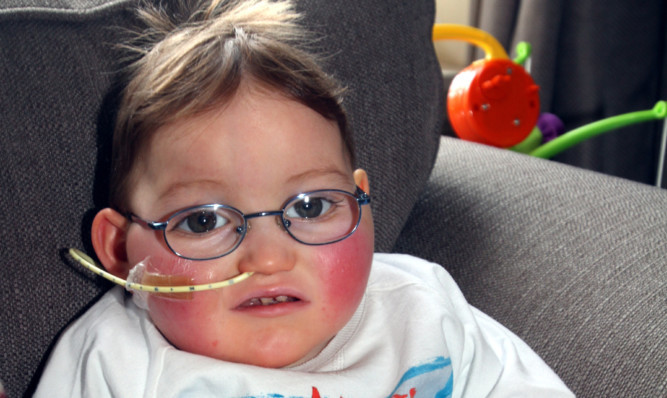It is hoped a Tayside toddler who received life-saving treatment in Edinburgh will return to Dundee this week.
Blake McMillan, from Carnoustie, was placed on life support earlier this month at the Royal Hospital for Sick Children in Edinburgh after coming down with pneumonia.
At one stage the prognosis was so bleak that parents Jenny and Paul were asked if they wanted doctors to intervene or let nature take its course.
However, the three-year-old’s condition has steadily improved and doctors are indicating that Blake, who was born with the MECP2 duplication syndrome, could be moved to Ninewells Hospital in the coming days.
Mum Jenny, who also has a six-year-old daughter Faye, praised the care Blake has received in Edinburgh and at Ninewells.
She said: “We have had wonderful care in both hospitals and I will be anxious leaving the security of intensive care but I’m so excited to be closer to my little girl.
“Things will be much easier when Blake returns to Dundee and hopefully it won’t be long till he is home.”
Jenny said Blake has surprised his family and the medical team.
She added: “The staff are amazed that he has pulled through. Last weekend, we didn’t think he would make it I was convinced I was about to lose my little boy.
“All the thoughts and prayers of family, friends, strangers and my fellow MECP2 families helped get me through each hour.
“I believe Blake wanted to live, he knows he has a life worth fighting for and family that love him and need him.
“I tell him all the time about the research and I apologise to him for spending time fundraising.
“One day it will be worth it I do it all for him.
“There are many MECP2 boys very poorly at the moment and I am constantly thinking of them too.”
Thousands of people have been following Blake’s progress through the Blake McMillan Trust page, which was set up to raise cash for those with the syndrome.
MECP2 families are joining together for The 401 Project a campaign to raise $1.2 million this year to go towards research into the condition.
It is hoped that 600 people will each raise $2,000 to begin clinical trials of a possible cure.
